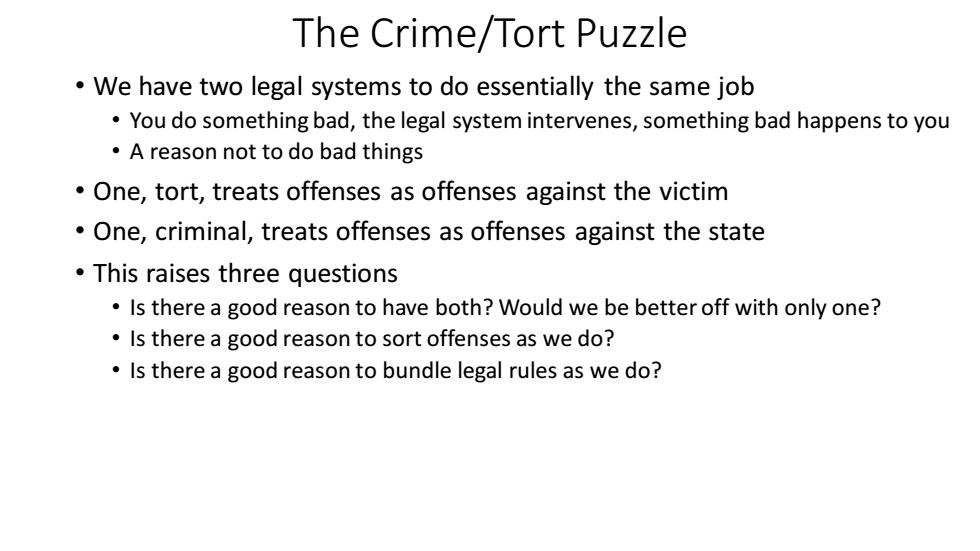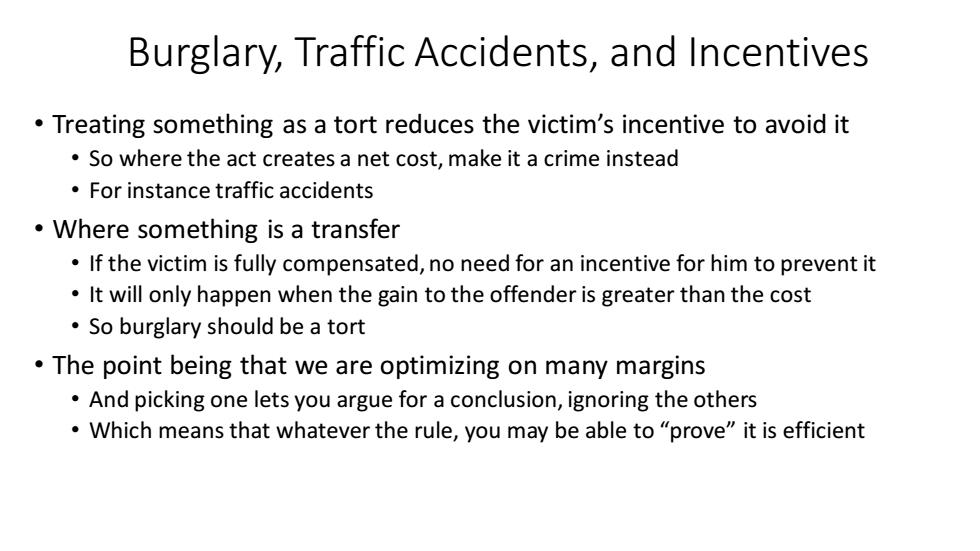
The Crime/Tort Puzzle We have two legal systems to do essentially the same job You do something bad,the legal system intervenes,something bad happens to you A reason not to do bad things One,tort,treats offenses as offenses against the victim One,criminal,treats offenses as offenses against the state This raises three questions Is there a good reason to have both?Would we be better off with only one? Is there a good reason to sort offenses as we do? Is there a good reason to bundle legal rules as we do?
The Crime/Tort Puzzle • We have two legal systems to do essentially the same job • You do something bad, the legal system intervenes, something bad happens to you • A reason not to do bad things • One, tort, treats offenses as offenses against the victim • One, criminal, treats offenses as offenses against the state • This raises three questions • Is there a good reason to have both? Would we be better off with only one? • Is there a good reason to sort offenses as we do? • Is there a good reason to bundle legal rules as we do?

Should We Abolish the Criminal Law? Imagine a pure tort system ·Problems The victim may not have the resources to prosecute. Some offenses cause diffuse injury Offenders may be judgement proof One could have legal rules making that less likely The state could pay the fine and imprison the offender-still mostly tort Potential victims could commit in advance to buy deterrence,as in 18th c.England The fine for a crime is both the punishment for the criminal and the reward for the victim We want the optimal probability/punishment pair But setting the punishment sets the probability,since it determines the payoff to catching him We cannot separately control two functions with one variable The fancy solution,using profit maximization for an additional constraint,is an article on my web page The simple answer is that the identical problem exists for ordinary tort law
Should We Abolish the Criminal Law? • Imagine a pure tort system • Problems • The victim may not have the resources to prosecute. • Some offenses cause diffuse injury • Offenders may be judgement proof • One could have legal rules making that less likely • The state could pay the fine and imprison the offender—still mostly tort • Potential victims could commit in advance to buy deterrence, as in 18th c. England • The fine for a crime is both the punishment for the criminal and the reward for the victim • We want the optimal probability/punishment pair • But setting the punishment sets the probability, since it determines the payoff to catching him • We cannot separately control two functions with one variable • The fancy solution, using profit maximization for an additional constraint, is an article on my web page • The simple answer is that the identical problem exists for ordinary tort law

Sorting Offenses Do we allocate offenses correctly to the two system? Tort law for offenses where we know who did it Landes/Posner argument That eliminates the probability/punishment problem for catching the offender But the chance of winning a tort suit depends on how much you are willing to spend Judgement proof argument If it is hard to catch the offender,we need a big fine to provide adequate deterrence Which the offender may not be able to pay And catching him is expensive,so we also need a big fine to make it worth doing On the other hand,torts are more likely than crimes to be anonymous victim And the torts we see litigated are the ones easy to detect
Sorting Offenses • Do we allocate offenses correctly to the two system? • Tort law for offenses where we know who did it • Landes/Posner argument • That eliminates the probability/punishment problem for catching the offender • But the chance of winning a tort suit depends on how much you are willing to spend • Judgement proof argument • If it is hard to catch the offender, we need a big fine to provide adequate deterrence • Which the offender may not be able to pay • And catching him is expensive, so we also need a big fine to make it worth doing • On the other hand, torts are more likely than crimes to be anonymous victim • And the torts we see litigated are the ones easy to detect

Bundling Legal Rules The same person controls prosecution and collects fines That makes sense,since otherwise the controller takes a bribe to drop the case But it creates an opportunity for fraudulent prosecution More efficient punishments go with a lower standard of proof Makes sense,since errors have lower social cost,but... An efficient punishment is an incentive for fraudulent prosecution Which is easier with a lower standard of proof
Bundling Legal Rules • The same person controls prosecution and collects fines • That makes sense, since otherwise the controller takes a bribe to drop the case • But it creates an opportunity for fraudulent prosecution • More efficient punishments go with a lower standard of proof • Makes sense, since errors have lower social cost, but … • An efficient punishment is an incentive for fraudulent prosecution • Which is easier with a lower standard of proof

Burglary,Traffic Accidents,and Incentives Treating something as a tort reduces the victim's incentive to avoid it So where the act creates a net cost,make it a crime instead For instance traffic accidents Where something is a transfer If the victim is fully compensated,no need for an incentive for him to prevent it It will only happen when the gain to the offender is greater than the cost So burglary should be a tort The point being that we are optimizing on many margins And picking one lets you argue for a conclusion,ignoring the others Which means that whatever the rule,you may be able to "prove"it is efficient
Burglary, Traffic Accidents, and Incentives • Treating something as a tort reduces the victim’s incentive to avoid it • So where the act creates a net cost, make it a crime instead • For instance traffic accidents • Where something is a transfer • If the victim is fully compensated, no need for an incentive for him to prevent it • It will only happen when the gain to the offender is greater than the cost • So burglary should be a tort • The point being that we are optimizing on many margins • And picking one lets you argue for a conclusion, ignoring the others • Which means that whatever the rule, you may be able to “prove” it is efficient